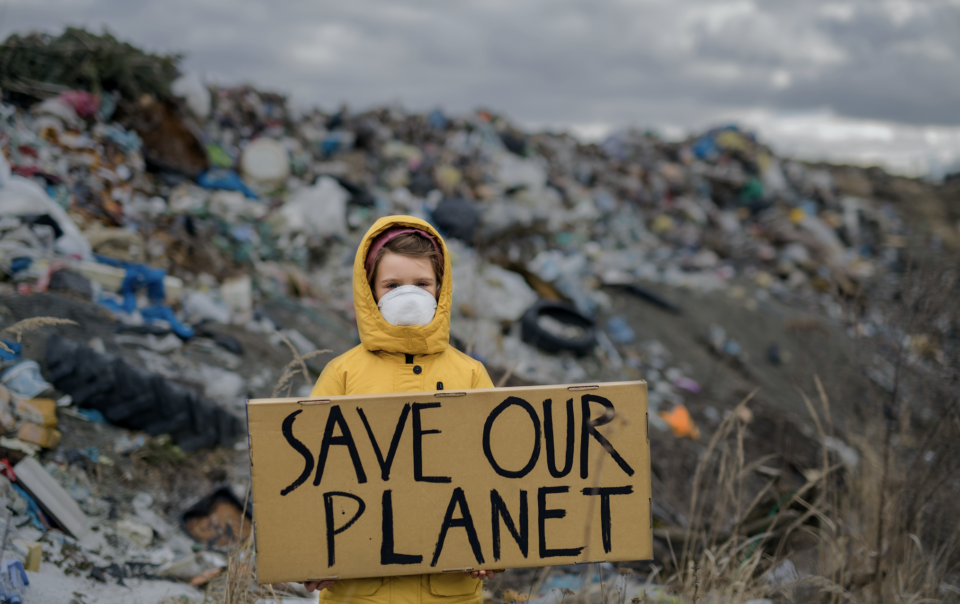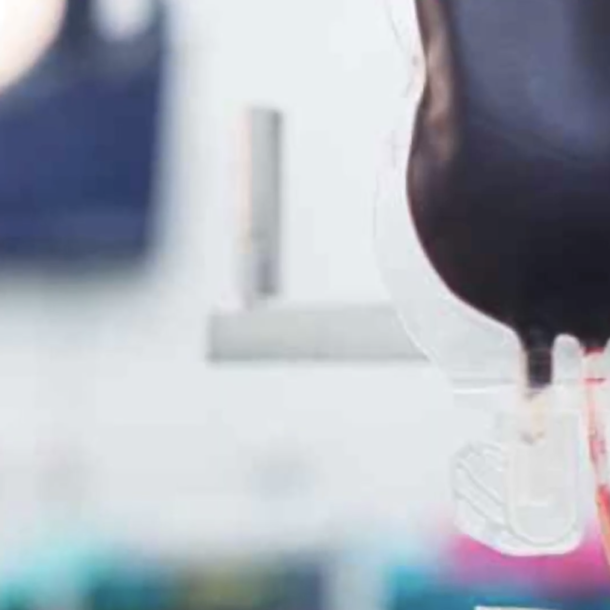
Reduced Inequalities เป็นหนึ่งในเป้าหมายข้อที่ 10 ของ Sustainable Development Goal ที่ว่าด้วยการลดความเหลื่อมล้ำ ความไม่เสมอภาค ทั้งภายในประเทศและระหว่างประเทศ
ในวันที่เราทุกคนต่างหวังว่าโควิดกำลังจะคลี่คลาย คงไม่มีอะไรดีไปกว่าการตั้งหลักปักธงถึงอนาคตหลังโควิด ไม่ว่าจะเป็นในมิติของเศรษฐกิจ อาชีพการงาน หรือสังคม เป็นที่มาของการสนทนาในหัวข้อ “ลดความเหลื่อมล้ำ (Reduced Inequalities)” ซึ่งเป็นเป้าหมายการพัฒนาที่ยั่งยืนข้อ 10 (SDGs 10) ที่ได้มือหนึ่งในแต่ละวงการมาล้อมวงพูดคุยผ่านแพลตฟอร์มออนไลน์ ดังต่อไปนี้
- คุณรื่นวดี สุวรรณมงคล เลขาธิการ สำนักงานคณะกรรมการกำกับหลักทรัพย์และตลาดหลักทรัพย์ (ก.ล.ต.)
- ดร.วิวัฒน์ ศัลยกำธร (อาจารย์ยักษ์) ประธานที่ปรึกษาธรรมธุรกิจ
- คุณพิเชษฐ โตนิติวงศ์ ผู้จัดการทั่วไป บริษัท ธรรมธุรกิจวิสาหกิจเพื่อสังคม จำกัด และ
- รศ.ทองทิพภา วิริยะพันธุ์ ที่ปรึกษาวิชาการ คณะบริหารธุรกิจ มหาวิทยาลัยหอการค้าไทย
ความเหลื่อมล้ำ ปัญหาสากลของคนทั่วโลก
รศ. ทองทิพภา เปิดบทสนทนาด้วยการให้คำจำกัดความว่า ความเหลื่อมล้ำเป็นเรื่องของความไม่เสมอภาค ความไม่เท่าเทียมในการกระจายทรัพยากรให้ผู้คนได้ไม่เท่ากัน เป็นคำถามของทั้งประเทศไทยและในต่างประเทศ เพราะมนุษย์เกิดมาพร้อมความแตกต่าง จึงย่อมมีความไม่เสมอภาคหรือไม่เท่าเทียมกัน แต่สถานการณ์ทำให้เกิดความเปลี่ยนแปลงได้ เช่น วิกฤติโควิดทำให้คนรวยกลายเป็นคนจน อย่างไรก็ตาม หากมองเรื่องความเหลื่อมล้ำเปรียบเทียบกับประเทศเพื่อนบ้านถือว่าประเทศไทยยังอยู่ในระดับที่ใช้ได้ เช่น การจ่ายค่าจ้างแรงงาน ก็ยังถือว่าจ่ายสูงกว่า ทำให้แรงงานต่างชาติทั้ง เวียดนาม พม่า กัมพูชา ลาว ยังต้องการเข้ามาทำงานในประเทศไทย
ก.ล.ต. เดินหน้าให้ทุกภาคส่วนเข้าถึงตลาดทุนได้
คุณรื่นวดี กล่าวว่า ตลาดทุนเป็นกลไกของเศรษฐกิจในประเทศ แผนพัฒนาตลาดทุนไทยเขียนไว้ชัดว่าจะต้องทำให้ทุกภาคส่วนสามารถเข้าถึงตลาดทุนไทยได้ (Capital Market for All) จากประเด็นการจัดสรรทรัพยากร ในส่วนของตลาดทุนไทยจะใช้กลไกตลาดทุนช่วยลดความเหลื่อมล้ำ (Reduced Inequalities) และให้สอดรับกับยุทธศาสตร์ชาติ รวมทั้งเป้าหมายการพัฒนาที่ยั่งยืน (SDGs) โดยตลาดทุนไทย และ ก.ล.ต.ซึ่งทำหน้าที่เป็นทั้งผู้พัฒนาและผู้กำกับดูแลได้ร่วมกันดำเนินการใน 3 โจทย์หลัก คือ
- การทำให้ธุรกิจขนาดเล็ก โดยเฉพาะ SME , Startup และ Social Enterprise หรือ SE ให้สามารถเข้าถึงตลาดทุนได้มากที่สุด
- ขยายความรู้ทางการเงิน (Financial Literacy) ไปสู่ภูมิภาคและกลุ่มเปราะบาง เช่น กลุ่มคนพิการ สตรี เด็ก และ
- การสร้างความมั่นคงสำหรับกลุ่มเกษียณ
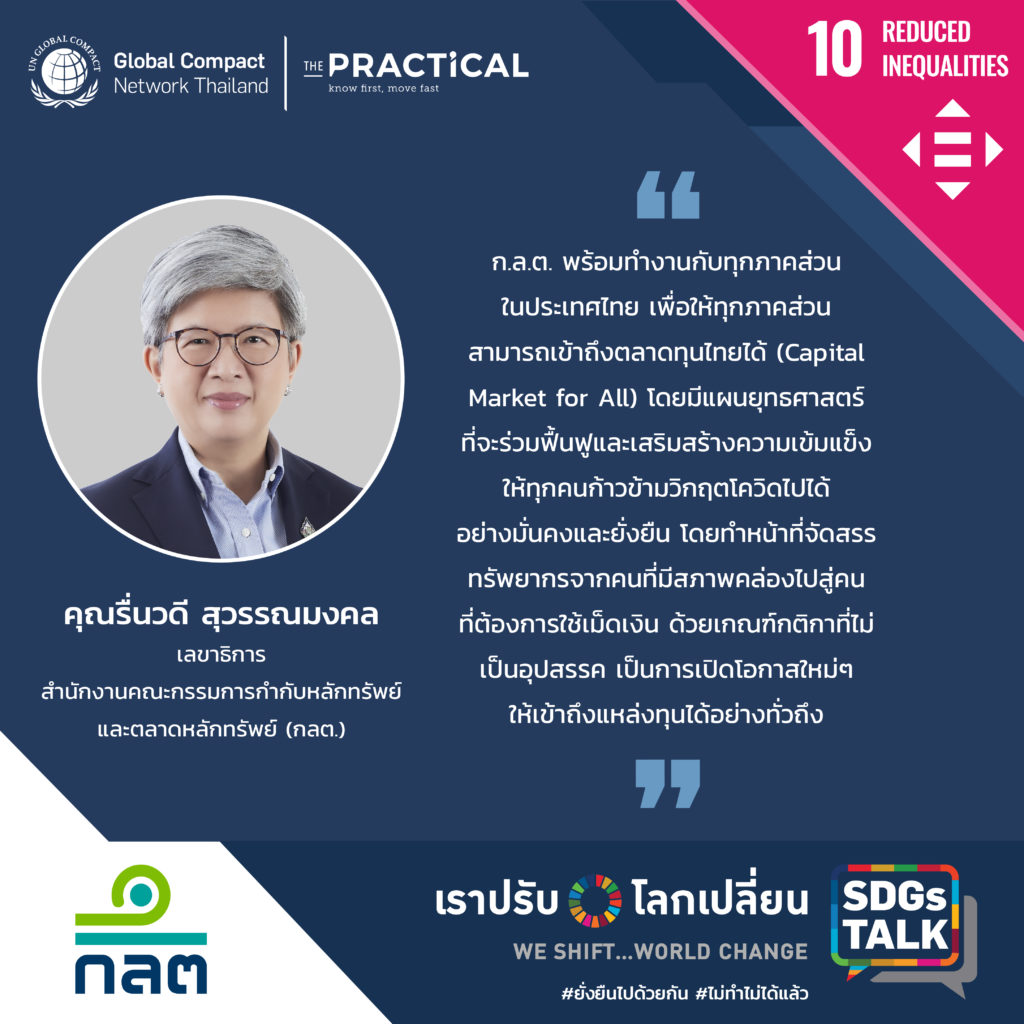
ภายใต้วิกฤตคือโอกาส
คุณรื่นวดี อยากให้มองว่า ภายใต้วิกฤตก็คือโอกาส อยากให้ทุกคนมีกำลังใจฝ่าฟันไปด้วยกัน เพราะมีผู้เดือดร้อนและได้รับผลกระทบในธุรกิจทุกสาขา โดยเฉพาะผู้ประกอบการขนาดเล็ก รวมถึงผู้รับจ้าง ซึ่ง ก.ล.ต. ได้ทำงานเชิงรุกในการให้ SME เข้าถึงตลาดทุนมากขึ้น โดยในเดือนมีนาคมปี 2563 ก.ล.ต. ได้ออกเกณฑ์ให้ SME สามารถระดมทุนจากผู้ลงทุนในวงแคบได้โดยตรง เนื่องจากกฎหมายแพ่งและพาณิชย์ ห้ามมิให้บริษัทจำกัดกระจายหุ้น จึงใช้กฎหมายหลักทรัพย์เพื่อเปิดให้กิจการสามารถเสนอขายหุ้น หรือ หุ้นกู้แปลงสภาพ (Convertible Debenture) ต่อบุคคลในวงจำกัดได้ รวมถึงสามารถเสนอขายหลักทรัพย์ต่อกรรมการและพนักงานได้ ESOP (Employee Stock Ownership Plan) ซึ่งเป็นสิ่งที่ตรงกับความต้องการของกิจการประเภท Startup เป็นอย่างมาก
ปลดล็อค SE คืนชีวิตให้ธุรกิจท่องเที่ยว
คุณรื่นวดี ย้ำว่า สำหรับ Social Enterprise (SE) หรือวิสาหกิจเพื่อสังคม ซึ่งมีโจทย์สำคัญอยู่ที่เรื่องของเงินทุน ในปี 2563 ก.ล.ต. ได้มีการออกหลักเกณฑ์ที่มาช่วยปลดล็อค โดยเปิดโอกาสให้ SE ที่จดทะเบียนกับสำนักงานส่งเสริมวิสาหกิจเพื่อสังคม (สวส.) สามารถระดมทุนผ่านตลาดทุนได้ โดยไม่ต้องยื่นคำขออนุญาตและ filing กับ ก.ล.ต. ซึ่งในปัจจุบัน มี 2-3 แห่งแล้วที่เข้าถึงตลาดทุน จึงอยากรณรงค์ให้ SE อื่นๆ เข้ามาระดมทุนผ่านตลาดทุนให้มากขึ้น เพื่อเป็นโอกาสที่ได้ร่วมทุนกับผู้ลงทุนรายใหญ่ในตลาด โดยเฉพาะผู้ที่มีความตั้งใจในการทำธุรกิจใหม่ๆ โดยเฉพาะเรื่องที่สนับสนุนต่อเศรษฐกิจชีวภาพ (Bio Circular Economy) ตอบโจทย์ความยั่งยืน จะได้มีโอกาสร่วมมือกันโดยใช้แพลตฟอร์มต่างๆ ที่ขึ้นทะเบียนกับ ก.ล.ต. และจุดสุดท้าย คือ ธุรกิจท่องเที่ยวซึ่งได้รับผลกระทบสูงมากในช่วงโควิด ปัจจุบันธนาคารแห่งประเทศไทยได้ออกโครงการพักทรัพย์ พักหนี้ (Asset Warehousing) เพื่อช่วยเหลือผู้ประกอบธุรกิจ ในขณะเดียวกัน ก.ล.ต. ได้ใช้กลไกตลาดทุน โดยออกเกณฑ์ “REIT buy-back” เพื่อเปิดเป็นทางเลือกให้มากขึ้น รวมทั้งยังได้ทำงานร่วมกันกับสภาหอการค้าไทย สมาคมโรงแรมไทย สมาพันธ์เอสเอ็มอีไทย และธนาคารเพื่อการเกษตรและสหกรณ์การเกษตร โดย ก.ล.ต. จะเป็นเพื่อนคู่คิดกับทุกธุรกิจ ทำให้เป็นที่ยอมรับและไว้วางใจ และช่วยเหลือทุกภาคส่วนให้สามารถผลักดันเรื่องความยั่งยืนและแก้ไขปัญหาความไม่เท่าเทียมได้อย่างแท้จริง
ธรรมธุรกิจ ต้นแบบวิสาหกิจเพื่อลดความเหลื่อมล้ำ
อาจารย์ยักษ์ ชี้ให้เห็นความเร่งด่วนของปัญหาความเหลื่อมล้ำว่าเป็นกระแสใหญ่มากและต่อเนื่อง โดยเฉพาะในช่วงที่ผ่านมาโลกถูก Disrupt บวกกับสถานการณ์โควิดที่ส่งผลกระทบเป็นลูกโซ่ ไปถึงเป้าหมายการพัฒนาที่ยั่งยืนข้อที่ 2 คือเรื่องความอดอยากหิวโหยด้วย โดยได้กล่าวย้ำความสำคัญว่า เรื่องของความเหลื่อมล้ำหรือความยากจน เป็นงานที่ในหลวงรัชกาลที่ 9 ทรงทำตลอดพระชนม์ชีพ หรือตัวอย่างการทำงานของศาสตราจารย์ยูนูส ที่ตั้งธนาคารคนจนขึ้นมา และหนุนรายย่อย ที่เรียกว่า SME หรือ Start Up ให้เกิดขึ้น มากกว่า 17,000 แห่ง สำหรับประเทศไทยโดยคณะกรรมการเศรษฐกิจ ได้ผลักดันจนเกิด พรบ. วิสาหกิจเพื่อสังคม จึงเป็นที่มาของการจดทะเบียนจัดตั้ง บริษัท ธรรมธุรกิจ วิสาหกิจเพื่อสังคม จำกัด ซึ่ง ก.ล.ต.ให้ระดมทุนนอกตลาดหลักทรัพย์ฯ ได้เป็นบริษัทแรก และได้ตั้งบริษัทอื่นๆตามมาอีก 5-6 บริษัท เช่น บริษัทขาดทุนคือกำไร ที่มาจากคำว่า our loss is our gain ของพระเจ้าอยู่หัวรัชกาลที่ 9 ซึ่งจดทะเบียนหลังจากธรรมธุรกิจ ตามมาด้วย บริษัท มาบเอื้อง จำกัด บริษัท คืนชีวิตให้กับแผ่นดิน และอีกหลายบริษัท ขณะนี้มี 8-9 บริษัทแล้วที่ช่วยอุ้มชูคนจน โดยเฉพาะ ช่วงโควิดที่คนไม่มีอาหาร ไม่มีบ้านพัก คนตกงาน หรือติดเชื้อ ซึ่งได้ระดมอาหารและยาจากเครือข่ายที่มีอยู่
ลดเหลื่อมล้ำ ด้วยการพึ่งพาตนเอง
คุณพิเชษฐ ผู้จัดการทั่วไปของธรรมธุรกิจ กล่าวเสริมว่า ความเหลื่อมล้ำ คือ การเข้าไม่ถึง ซึ่งสิ่งแรก คือ ความรู้ และเล่าให้ฟังถึงก้าวแรกของการให้ความรู้กับผู้คนของธรรมธุรกิจ ซึ่งเริ่มขึ้นในปี 2556 ที่สร้างศูนย์ฝึกอบรมสันป่าตอง เชียงใหม่ ปรับพื้นที่ว่างเปล่าเป็นโคกหนองนา และแล้วเสร็จในปี 2559 แต่ได้เริ่มเปิดอบรมและขายหุ้นตั้งแต่ปี 2557 โดยเริ่มจากกลุ่มลูกศิษย์อาจารย์ยักษ์ก่อน แต่เป็นวิธีการที่ขัดกับ พรบ.หลักทรัพย์ฯ จึงจำเป็นต้องหยุด และพยายามจัดตั้งเป็นวิสาหกิจเพื่อชุมชน ขออนุญาตให้ขายหุ้น มีการเริ่มฟังความคิด จนกระทั่ง กลต. ประกาศ พรบ.วิสาหกิจเพื่อสังคม ในวันที่ 1 กุมภาพันธ์ 2563 ซึ่งเดิมเลี่ยงใช้คำว่า ลงขัน คือ เป็นเงินบริจาคแต่ขอเงินคืนได้ ซึ่งแท้จริงคือ หุ้น โดยในปี 2562 จำเป็นต้องลงขันธุรกิจ เพราะฐานธรรมที่ชุมพรคาบาน่า กำลังจะถูกขายทอดตลาด ต้องหาเงินไปจ่ายเจ้าหนี้ 120 ล้าน ภายในวันที่ 5 ธันวาคม 2562 ซึ่งถ้าไม่ใช้คำว่า “ลงขัน” ในตอนนั้น คงรักษาชุมพรคาบาน่าไม่ได้
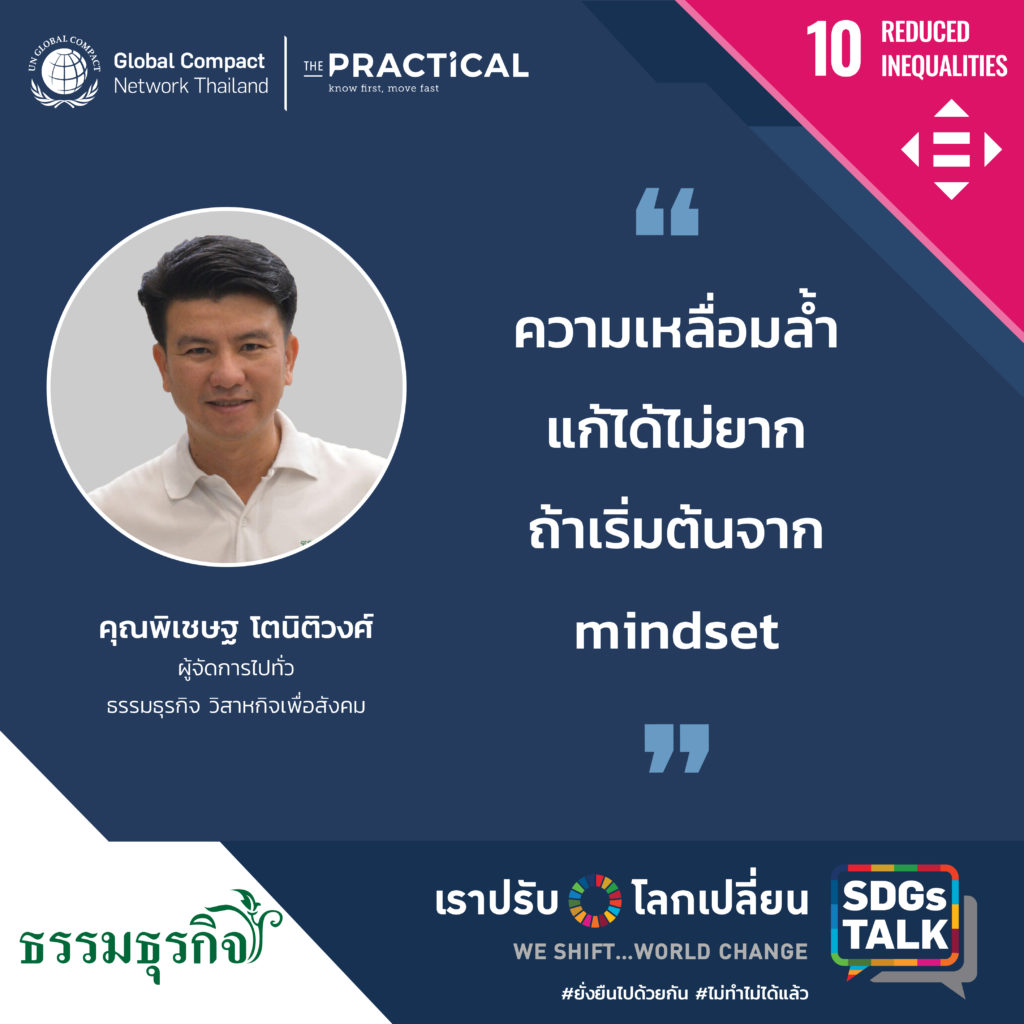
คุณพิเชษฐ เล่าต่อว่า ชุมพรคาบาน่า ถือเป็นตัวอย่างของการให้ความรู้คน เพื่อลดความเหลื่อมล้ำได้อย่างดี เพราะมีการฝึกอบรมเกิดขึ้นมากกว่า 70 รุ่น คนเข้าร่วมมากกว่า 7,000 คน พอมาถึงปี 2563 กิจการขยาย มีระบบรถพุ่มพวงของธรรมธุรกิจ เอาข้าว ผัก ไข่ สินค้าแปรรูป อาหารทะเลไปเสริฟถึงหน้าบ้านของผู้คน มีตลาดนัดธรรมชาติ มีร้านอาหารยักษ์กับโจน ช่วงโควิด ยิ่งเป็นโอกาสเพิ่มยอดขายขึ้น 3 เท่า เพราะคนหาอาหารเพื่อทำให้ร่างกายแข็งแรง กลายเป็นว่าความเหลื่อมล้ำของคนจนในเมืองและความเหลื่อมล้ำของคนร่ำรวยในเมืองมีค่าเท่ากัน ในการเข้าถึงอาหารที่ปลอดภัยและเป็นประโยชน์ต่อร่างกาย และสิ่งที่ธรรมธุรกิจ ทำต่อเนื่องมาถึงช่วงโควิด คือเรื่องทำน้ำสมุนไพร7 นางฟ้า เพื่อแจกคนไร้บ้าน ซึ่งยิ่งทำให้เห็นความเหลื่อมล้ำชัดเจนและมากขึ้น
อนาคต SME ในตลาดทุน
คุณรื่นวดี กล่าวว่าธรรมธุรกิจเป็นต้นแบบของ SE ที่เข้าสู่ตลาดทุน ทำให้คนเล็กๆ สามารถเข้าถึงตลาดทุนได้ ไม่ต้องจ้างที่ปรึกษาทางการเงิน โดยใช้ช่องทางการระดมทุนผ่านแพลตฟอร์ม crowdfunding เช่น SME ในมาเลเซียจะรู้จัก การระดมทุนแบบ Crowdfunding มากกว่าตลาดหลักทรัพย์ โดยกู้เงินผ่านแพลตฟอร์มนี้ทีละไม่มาก ประมาณ 30,000 บาท แทนการไปกู้ธนาคาร ซึ่งปัจจุบัน การระดมทุนแบบ Crowdfunding ในรูปแบบหลักทรัพย์ในประเทศไทย ที่สำนักงาน ก.ล.ต. กำกับดูแลเริ่มเป็นที่รู้จัก
โดยปัจจุบันมียอดการระดมทุน Crowdfunding ในรูปแบบหลักทรัพย์ทั้งหุ้นและหุ้นกู้ โดยมี SMEs startups ระดมทุนด้วยวิธีนี้ประมาณ 110 บริษัท วงเงินการระดมทุนรวมประมาณ 1,000 ล้านบาท พร้อมทั้งเปิดเผยว่า ขณะนี้ ก.ล.ต. ร่วมกับตลาดหลักทรัพย์ฯ กำลังจะทำกระดานที่ 3 จากเดิมที่มีสำหรับบริษัทขนาดใหญ่ และ MAI อาจจะเพิ่มให้สำหรับ SME โดยในเฟสแรกให้ระดมทุนได้ ต่อไปต้องมีสภาพคล่องสามารถซื้อขายได้ แต่อาจมีความแตกต่างจากกระดานหลักหรือ MAI เพราะหุ้น SME มีความเสี่ยงในระดับสูงกว่า ซึ่งกระดานนี้ทำให้ SME ที่โตมาในระดับหนึ่ง สามารถสร้างสภาพคล่องและเข้าถึงตลาดทุนได้มากขึ้น โดย SME ต้องอยู่ในระบบ มีมาตรฐานบัญชีและการเสียภาษีที่ถูกต้อง และสุดท้าย ก.ล.ต. ยังเดินหน้าส่งเสริมให้ตลาดทุนยั่งยืนทั้งระบบอย่างต่อเนื่อง
โดยเฉพาะการสนับสนุนให้มีเครื่องมือระดมทุนรองรับธุรกิจหรือโครงการเพื่อสังคมและสิ่งแวดล้อมอย่างตราสารหนี้ในกลุ่มความยั่งยืน หรือ Sustainable Bond ซึ่งได้รับความสนใจจากทั้งภาครัฐและภาคเอกชน เนื่องจากช่วยส่งเสริมการจัดสรรเงินทุนไปสู่กิจกรรมทางเศรษฐกิจที่คำนึงถึงสิ่งแวดล้อมหรือการช่วยเหลือกลุ่มเปราะบางและพัฒนาสังคม เช่น การเคหะฯ ออก Social Bond เพื่อลงทุนพัฒนาโครงการที่อยู่อาศัยสำหรับประชาชนผู้มีรายได้น้อยและปานกลาง หรือที่ธนาคารพาณิชย์แห่งหนึ่งออก Gender Bond เพื่อสนับสนุนการให้สินเชื่อแก่ผู้ประกอบการ SME ที่เป็นผู้หญิง นอกจากนี้ ก.ล.ต. ยังติดตามพัฒนาการในต่างประเทศเพื่อศึกษานวัตกรรมทางการเงินใหม่ ๆ ตัวอย่างเช่น Social impact bond (SIB) โดยในประเทศอังกฤษมีการระดมทุนผ่าน SIB เพื่อนำเงินไปดำเนินโครงการลดอัตราการติดคุกซ้ำของนักโทษ หรือการร่วมมือกันระหว่างรัฐและเอกชนในประเทศเกาหลีใต้ โดยการใช้ SIB ระดมเงินเพื่อนำไปดำเนินโครงการพัฒนาศักยภาพกลุ่มเด็กที่มีกลไกทางสติปัญญาบกพร่อง ซึ่งทั้งหมดนี้สามารถช่วยลดความเหลื่อมล้ำได้ โดยไม่ต้องพึ่งพางบประมาณจากรัฐบาล แต่ใช้การระดมทุนผ่านตลาดทุน ถือว่าเป็นการตอบโจทย์เรื่องการลดความเหลื่อมล้ำ และทำให้เงินทุนไปถึงมือผู้ที่ต้องการใช้อย่างแท้จริง
“CSR พอเพียง model” เครื่องมือลดเหลื่อมล้ำ
รศ. ทองทิพภา แชร์มุมมองจากภาควิชาการว่า ได้ขับเคลื่อนเรื่องนี้ร่วมกับหอการค้าไทย โดยเชื่อว่าถ้ามีความพอเพียงในการใช้ชีวิตและในการทำธุรกิจ เรารอดแน่นอน โดยประยุกต์เรื่อง CSR ซึ่งเป็นเครื่องมืออย่างหนึ่งในการลดความเหลื่อมล้ำ ที่ภาคเอกชนสามารถมีส่วนร่วมได้ นำมาพัฒนาเป็น “CSR พอเพียง model” และนำไปปฏิบัติงานจริงในหมู่บ้านซับผุด จังหวัดเพชรบูรณ์ ซึ่งเป็นหมู่บ้านที่ไม่มีน้ำมา 50 ปีแล้ว โดยมีการฟื้นฟูป่าและดึงน้ำจากป่ามาใช้เป็นประปาหมู่บ้าน มีบริษัทเอกชนสนับสนุนเรื่องการวางท่อ ทำให้สามารถทำการเกษตรและส่งเสริมความรู้ภูมิปัญญาท้องถิ่นเพื่อแปรรูปผลิตภัณฑ์ เพิ่มมูลค่าได้ จนหมู่บ้านนี้แข็งแรงและสามารถยืนอยู่ได้ด้วยตัวเอง
โดยเฉพาะช่วงโควิด ชุมชนมีรายได้เลี้ยงตัวเอง และมีความสุขกับชีวิตที่เป็นอยู่ ถือเป็นผลงานที่พิสูจน์ได้ว่า CSR พอเพียง model ช่วยเรื่องการพึ่งพาตัวเองได้และเมื่อบูรณาการความร่วมมือทุกภาคส่วนก็ประสบความสำเร็จ สิ่งสำคัญที่สุด คือ ผู้นำและชุมชนต้องเข้มแข็ง ทำให้เห็นว่า ถ้าต้องการสร้างความเสมอภาคเพื่อลดความเหลื่อมล้ำ สิ่งหนึ่งที่ต้องทำ ก็คือ ต้องเสริมสร้างศักยภาพของกลุ่มเป้าหมาย ดูพฤติกรรม ทัศนคติ ความต้องการ สิ่งแวดล้อมและบริบทในสังคมที่เขาอยู่ ว่าสามารถพึ่งพาตนเองได้ในรูปแบบใด แล้วส่งเสริมไปที่จุดนั้น
Mini MBA for Social Enterprise ติดอาวุธความรู้ เปลี่ยนมูลนิธิเป็น SE
รศ. ทองทิพา ยังได้กล่าวถึงการจัดตั้งหลักสูตร Mini MBA for Social Enterprise เพื่อเปลี่ยนจากการทำงานแบบ “มูลนิธิ” ให้เป็น “ผู้ประกอบการเพื่อสังคม” โดยไม่มีค่าใช้จ่าย และสอนตั้งแต่พื้นฐานเพื่อให้รู้หลักการทำธุรกิจ โดยมี concept คือ คนซื้อต้องซื้อเพราะอยากซื้อ ไม่ใช่ซื้อเพราะสงสาร เพราะถ้าเขาซื้อเพราะชอบสินค้า เขาจะซื้อตลอดไป จึงเป็นจุดปลี่ยนให้สมาคมคนพิการทั้ง 7 แห่งเข้ามาเรียน สามารถสร้างความเปลี่ยนแปลง ความตื่นตัว และเตรียมความพร้อมในการรองรับวิกฤติต่างๆ และเชื่อมั่นว่า ทุกคนมีศักยภาพซ่อนเร้นที่สามารถเปลี่ยนแปลงพัฒนาตนเองไปสู่ชีวิตที่ไม่เหลื่อมล้ำได้ สามารถมีรายได้ มีอาชีพ และอยู่อย่างมีความสุขได้ ขอแค่ให้ลุกขึ้นสู้ โดยทุกภาคส่วนยินดีช่วยเหลือเป็นพี่เลี้ยง ประกอบกับเมื่อมีกลไกที่เหมาะสม ก็จะเกิดการพัฒนาเปลี่ยนแปลงในด้านต่าง ๆ และความเหลื่อมล้ำก็จะลดน้อยลง
สร้าง Mindset ผู้ประกอบการ หัวใจของการพึ่งพาตนเอง
บทสนทนาดำเนินมาถึงครึ่งทาง ทุกท่านเห็นพ้องต้องกันว่า การพึ่งพาตนเอง คือ สิ่งสำคัญในการลดความเหลื่อมล้ำ อาจารย์ยักษ์ จึงได้ชี้ชัดลงไปอีกว่า การที่จะทำอย่างนั้นได้ ต้องสร้าง Mindset ใหม่เรื่องการศึกษา ส่งเสริมให้เกิดการเรียนรู้ตลอดชีวิต ต้องทำให้ทุกคนมีส่วนร่วมในการจัดการศึกษา และต้องนำปัญหาหรือสถานการณ์จริงของสังคมมาเป็นฐานในการออกแบบการศึกษา หรือที่เรียกว่า Problem หรือ Situation-based Learning โดยมีโจทย์ใหญ่ร่วมกัน คือ เราจะทำอย่างไรทำให้ประเทศไทยมีระบบเศรษฐกิจ ระบบสังคม ระบบการศึกษา ที่พึ่งพากันในประเทศเป็นหลัก พึ่งพาต่างประเทศให้น้อยลง สร้างให้คนช่วยลุกขึ้นช่วยเหลือคนอื่นด้วยจิตอาสา โดยเอาปัญหาของชาติ 7 ปัญหาเป็นตัวตั้ง เช่น ความเหลื่อมล้ำ ความอดอยาก ภัยแล้ง น้ำท่วม ป่าถูกทำลาย รวมถึงปัญหาขยะ และให้ร่วมมือกับ สพฐ.ในการวางหลักสูตรแก้ปัญหาจากการปฏิบัติจริง ที่เรียกว่า Active Learning เพื่อใช้กับโรงเรียน 30,000 แห่ง ที่สำคัญที่สุด คือ ต้องสร้างวิญญาณผู้ประกอบการให้กับคนรุ่นใหม่ ปลูกฝังในเด็กตั้งแต่เล็กๆ เพราะประเทศใดที่สอนให้เด็กไปเป็นลูกจ้างก็ยากที่จะเจริญ หรือให้สังเกตุว่าคนที่ถูกออกจากงานจะเปลี่ยนอาชีพยากมาก สุดท้ายไปเป็นเกษตรกร ซึ่งยากกว่าทุกอาชีพ ถ้าเจอน้ำท่วม ภัยแล้ง ส่วนใหญ่จะหมดตัว ในวันนี้ เรื่องใหญ่ที่สุดที่หลายภาคส่วนกำลังช่วยกันผลักดัน คือ ทำให้แนวคิดของวิสาหกิจเพื่อสังคม หรือ Social Enterprise แพร่ออกไป แต่กลไกที่สำคัญสูงสุด คือ การให้การศึกษา
วาดอนาคตด้วยความรู้ การปรับตัว และความร่วมมือกับเครือข่าย
คุณรื่นวดี แสดงความเห็นด้วยว่า การให้ความรู้หรือการศึกษาอย่างต่อเนื่อง เป็นเรื่องสำคัญ พอ ๆ กับการปรับตัว และการสร้าง Ecosystem เพื่อทำให้เกิดความร่วมมือกันของเครือข่าย ทั้งในตลาดทุนเอง เช่น สมาคมบริษัทจดทะเบียน หรือตลาดหลักทรัพย์ รวมทั้งความร่วมมือจากต่างประเทศ และจากเครือข่ายอื่น ๆ โดยแสดงความเชื่อมั่นว่า ผู้ประกอบการในตลาดทุนพร้อมที่จะขับเคลื่อนในเรื่องนี้ และย้ำว่าในอนาคตเมืองไทย ยังเป็นประเทศที่อุดมสมบูรณ์ ที่มีจุดแข็งมาก ขอให้ทุกคนมีความขยัน มองหาจุดแข็งในแต่ละเรื่อง และปรับตัวให้ได้ตามสิ่งแวดล้อมที่เปลี่ยนแปลงไป ซึ่งตลาดทุนพร้อมจะเป็นแกนนำ เพื่อให้เป็น Capital Market for All อย่างแท้จริง เพื่อแสดงให้เห็นว่าเราพร้อมที่จะสนับสนุนและทำงานร่วมกันในเรื่องนี้ต่อไป
สามัคคีเป็นพลัง ค้ำจุนแผ่นดินไทย
อ.ยักษ์ กล่าวทิ้งท้ายว่า ในขณะที่ทั่วโลกวิตกกังวลว่าในวิกฤติโควิดนี้จะไปต่อได้อย่างไร มีคำถามว่า “ไทยจะอยู่อย่างไร” แน่นอนว่าต้องถอยกลับมาอยู่ในที่มั่นของเรา และสมเด็จพระเจ้าอยู่หัวรัชกาลที่ 9 ท่านย้ำแล้วว่า ภูมิปัญญาของเรามีมาก ทั้งการแพทย์ การอาหาร แม้แต่ logistic ไม่ต้องไปพึ่งพาอาศัยต่างประเทศ ถ้าคิดแต่พึ่งพาต่างประเทศ คือ กำลังตั้งตนอยู่ในความประมาท เพราะว่าทั่วโลกก็จะพึ่งตนเองเพื่อความอยู่รอด ไม่ให้เราพึ่งง่ายๆ
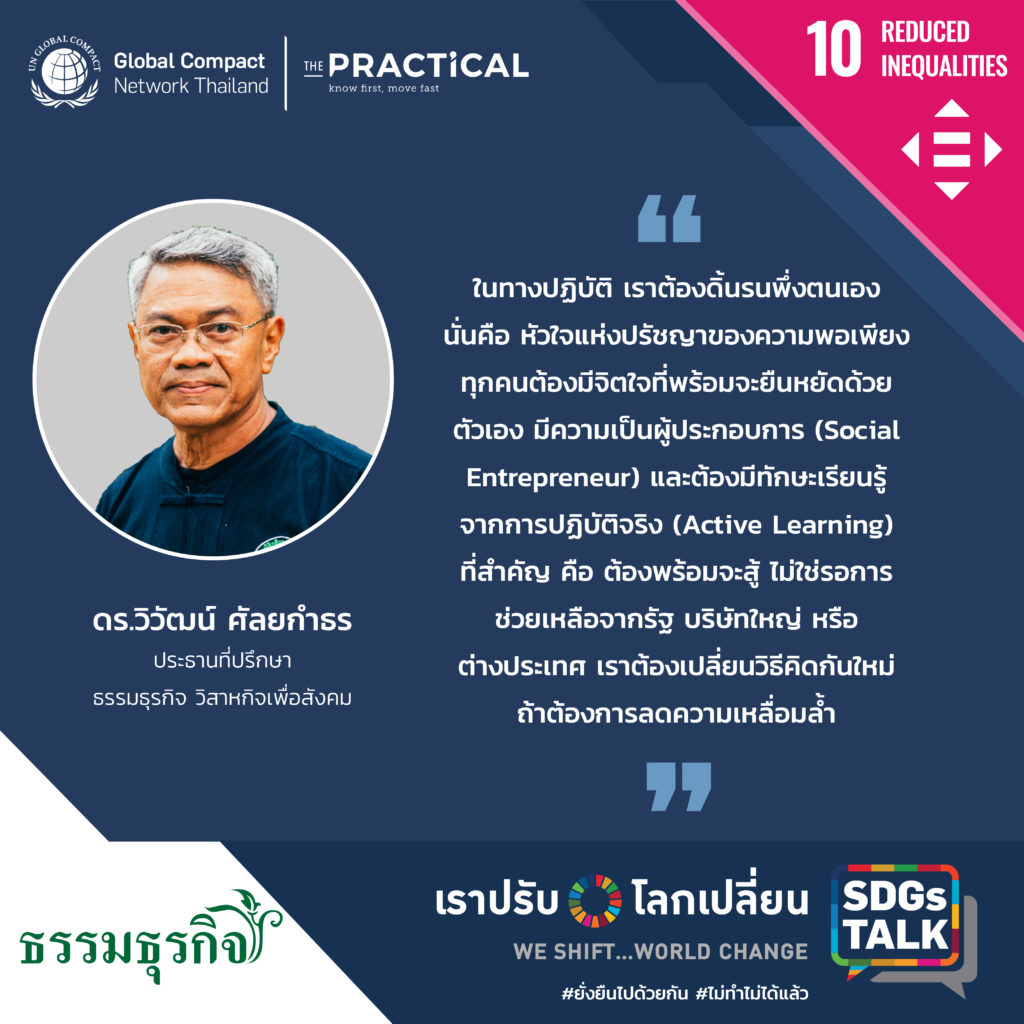
ในทางปฏิบัติ เราจึงต้องดิ้นรนพึ่งตนเอง นั่นคือ หัวใจแห่งปรัชญาของความพอ เพราะฉะนั้น สิ่งที่ต้องทำข้อแรก คือ การสร้างคนให้มีจิตใจที่พร้อมจะยืนหยัดด้วยตัวเอง เรียกว่าเป็นมีจิตวิญญาณผู้ประกอบการหรือ Social Entrepreneur สอง คือ ต้องมีทักษะการเรียนรู้จากการปฏิบัติจริงเรียกว่า Active Learning ซึ่งต้องสร้าง ecosystem เพื่อกระตุ้นให้เกิดกระบวนการนี้ โดยเมืองและชนบทต้องอุ้มชูซึ่งกันและกัน ไม่ใช่ปล่อยให้เมืองหรือชนบท อยู่กันไปตามอัตภาพ และข้อสุดท้าย SDGs 17 Partnership for SDGs เพื่อสนับสนุนเป้าหมายข้อ 2 ซึ่งจะเกิดไม่ได้เลยถ้าไม่ร่วมมือกัน เพราะฉะนั้น การร่วมมือกัน จึงเป็นหัวใจสำคัญ ตามพระราชดำรัสของพระเจ้าอยู่หัวว่า สามัคคีเป็นพลัง ค้ำจุนแผ่นดินไทย
Inclusive growth พัฒนาทุกภาคส่วน โดยไม่ทิ้งกันไว้ข้างหลัง
รศ.ทองทิพภา กล่าวสรุปว่า ถึงเวลาที่ต้องเปลี่ยนผ่านประเทศไทยแล้ว ให้คนรุ่นใหม่เป็นพลังในอนาคต และต้องส่งเสริมคนรุ่นใหม่ให้มีศักยภาพและประสิทธิภาพ โดยการมุ่งเน้นในเรื่องการศึกษา ไม่ว่าจะเป็นด้านเทคโนโลยี การปรับเปลี่ยนตัวเอง ปรับเปลี่ยน mindset พัฒนาทักษะในการบริหารจัดการและการเป็นผู้ประกอบการของสังคม เพราะจะต้องเป็นคนที่ดูแลสังคมในอนาคต ซึ่งคือ เรื่องการเรียนรู้ตลอดชีวิต Life-long Learning
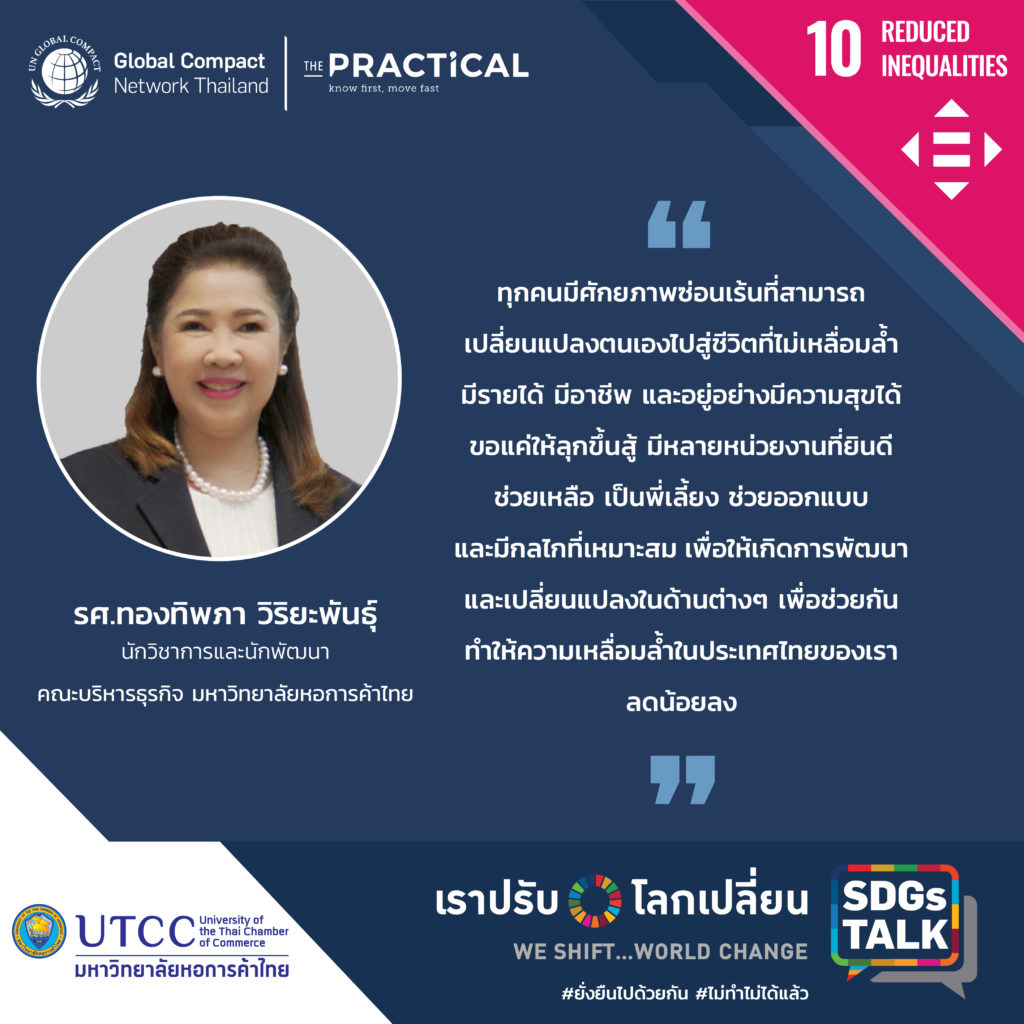
ดังนั้น เด็กยุคนี้อยู่ในยุค Agile ต้องพร้อมปรับตัว คนรุ่นใหม่จะเป็นกลุ่มคนที่สร้างงาน สร้างรายได้ เพื่อจะเลี้ยงตัวเขาเองและผู้สูงอายุ ต้องสร้างความรู้สึกรับผิดชอบต่อส่วนรวม และเป็น inclusive growth คือ การที่ร่วมกันพัฒนาทุกภาคส่วน โดยที่จะไม่ทิ้งกันไว้ข้างหลัง
….
รายการ “เราปรับ…โลกเปลี่ยน We Shift…World Change”
ตอน “Reduced Inequalities – ลดความเหลื่อมล้ำ เพื่อความยั่งยืน”
หรือ จะเลือกรับฟังรายการ ในรูปแบบของ Podcast ได้ที่:
ติดตามชมรายการ “เราปรับ…โลกเปลี่ยน We Shift…World Change” Facebook
ได้ทาง Facebook เพจ @มนุษย์เงินเดือนพันธุ์ใหม่ หรือ Facebook Global Compact Network Thailand และ ช่องทาง Social Media ของ The Practical


